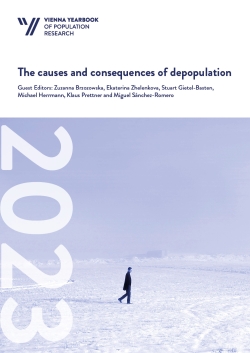
Vienna Yearbook of Population Research 2023, pp. 41, 2023/03/17
The causes and consequences of depopulation

Summarising earlier publications, I draw a rather optimistic picture of the human future on this planet, if priority is given to universal education, and, in particular, to female education. The benefits of a greater focus on education range from a lower desired family size and empowerment to reach this goal, to better family health, to poverty reduction, to greater resilience, to expanded capacities to mitigate and adapt to climate change, and, ultimately, to the emergence of better institutions and social values that are less obsessed with material consumption and violent nationalism and more concerned with cooperation, care and wellbeing. I also show that extended periods of below replacement level fertility are beneficial for long-term human wellbeing, and that the human population is on the path to peaking during the second half of this century and then declining to 2–4 billion people by 2200. As this smaller population will be well-educated, they should be healthy and wealthy enough to be able to cope fairly successfully with the already unavoidable (moderate) effects of climate change.
Keywords: population; climate change; long-term; human capital; female education